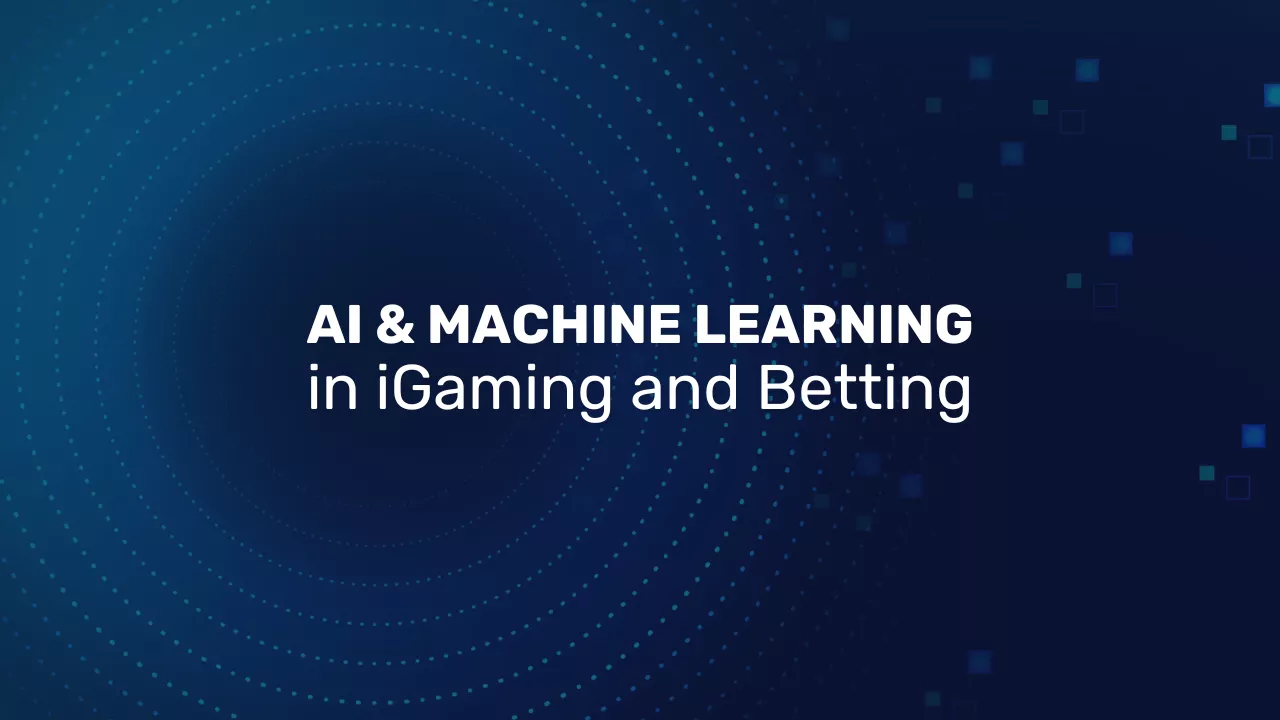Interviews et Éditoriaux
Role of AI and Machine Learning in iGaming and Betting
by Igor Bradara, Managing Director of AI Services at NSoft

The era of digital transformation is here, marking a new chapter in technological evolution. Notable products of this transformation, artificial intelligence (AI) and machine learning (ML), are significantly impacting various sectors, including the iGaming and betting industry which is utilizing this technological shift to its advantage.
Throughout technological history, periods of rapid growth and expansion have typically been spurred by key innovations. The world of iGaming and betting currently finds itself in such a phase, with AI and ML serving as primary drivers. These technologies, recognized for their ability to learn and improve independently of explicit programming, bring forth fresh opportunities in customer service, fraud detection, money laundering prevention, data analysis, and beyond.
This article intends to closely examine the influence of AI and ML in the iGaming and betting industry. We will explore their various applications, delve into the associated challenges, and consider the future prospects of these advanced technologies within the sector.
Demystifying AI and ML
#

AI and machine learning, which are frequently used interchangeably, are distinct but interconnected fields. AI, in its broadest sense, is the science of creating intelligent machines capable of performing tasks that normally require human intelligence. These tasks can range from speech recognition to decision-making, pattern recognition, and natural language understanding.
ML, on the other hand, is a subset of AI that involves the study of computer algorithms that improve automatically through experience and the use of data. It's the ML algorithms that provide the "learning" or "intelligence" in an AI system.
By extracting valuable insights from previous computations, ML algorithms can generate reliable, repeatable decisions and results. It's these characteristics that make ML, and by extension AI, particularly valuable in iGaming and betting, where enormous volumes of data are generated and decisions often have to be made in real-time.
Harnessing AI and ML in iGaming and Betting
#

Companies in the ever-competitive world of iGaming and betting are constantly looking for ways to improve user experience, operational efficiency, and stay ahead of fraudulent activities. AI and ML, with their powerful capabilities, provide a much-needed competitive advantage to each business model in the industry.
Amplifying User Experience with Personalization #
In today's digital age, personalization is the key to gaining customer loyalty. Players are no longer satisfied with generic, one-size-fits-all content; they want a personalized experience based on their interests, behaviors, and playing habits. This is where AI and ML learning shine.
By sifting through mountains of user data, ML algorithms can learn a player's preferences, habits, risk tolerance, and more. This user-specific data allows for the personalization of gaming experiences, enabling the delivery of customized content, recommendations, and offers that resonate with individual players. This not only improves the user experience but also fosters player loyalty and increases retention rates.
Predictive Analytics: The Game-Changer #
Another area where AI and ML are making an impact is predictive analytics. These technologies can analyze massive amounts of historical data, identify patterns, and predict future outcomes, which is extremely valuable in the iGaming and betting industry.
For instance, ML can be used to create models that analyze a player's past betting behavior to predict their future actions. This information can be used to not only improve user engagement and retention but also identify potential problem gambling before it escalates. On the operator's side, predictive models can be utilized to forecast market trends and optimize game offerings, maximizing profitability.
Risk Management and Fraud Detection: Fortifying the Ecosystem #
With the iGaming and betting industry's high transaction volume and substantial financial stakes, it becomes a lucrative target for fraudulent activities. Here, AI and ML come to the rescue. These technologies are highly effective in detecting anomalies and irregular patterns that may hint at fraudulent activities or problem gambling.
Advanced AI and ML algorithms can scrutinize player behavior, looking for any deviations from the norm. A player who frequently stakes large bets but suddenly starts wagering smaller amounts, for example, could be an indication of fraud or money laundering. AI systems can flag such behaviors in real-time, allowing for quick interventions and safeguarding both players and operators.
Simultaneously, these systems can also evaluate the risk associated with specific bets or players, offering a more nuanced understanding of the betting environment. This knowledge is crucial for operators, as it allows them to optimize their risk management strategies and make informed decisions about game offerings and betting limits.
Addressing the Challenges of AI and ML in iGaming and Betting #

The benefits of integrating AI and ML into the iGaming and betting industry are substantial. However, the adoption of these cutting-edge technologies is not without challenges. Recognizing and addressing these obstacles is crucial to harnessing the full potential of AI and ML.
Data Privacy and Security: Striking the Balance #
In an era where data is the new oil, data privacy and security concerns are paramount. The success of AI and ML is heavily reliant on access to a diverse set of user data, which raises legitimate concerns about data security and privacy. Operators must ensure their use of these technologies complies with relevant data protection regulations and that they take the necessary precautions to protect user data. This requires a delicate balancing act - using data to enhance services while ensuring privacy and security.
The Accuracy Conundrum: Garbage In, Garbage Out #
As with any data-driven technology, the accuracy of AI and ML models depends greatly on the quality of the data they are trained on. Poor quality data - whether it's inaccurate, incomplete, or biased - can lead to flawed results and predictions. This can have significant implications for both players and operators, ranging from subpar user experiences to substantial financial losses.
Companies must invest in high-quality, dependable data to ensure the efficacy of their AI and ML initiatives. This may involve implementing robust data collection and management systems, conducting regular data audits, and continuously refining their ML models.
The 'Black Box' Dilemma: Transparency and Trust #
Another challenge is the so-called 'black box' problem. Due to their complex and often opaque inner workings, many AI and ML models lack transparency, making it difficult to understand how they arrive at certain predictions or decisions. This lack of interpretability can hinder troubleshooting, validation of results, and, importantly, trust in these technologies.
As a result, there is growing demand for explainable AI - AI systems that can provide clear, understandable explanations for their decisions. This involves a trade-off between accuracy and interpretability, and requires careful consideration on the part of operators.
The Future Landscape of AI and ML in iGaming and Betting #

Despite the challenges mentioned, the future of AI and ML in iGaming and betting is highly promising. As these technologies continue to mature, they will have a greater impact on the industry.
Increasing Accuracy and Reliability #
The coming years will see continued improvements in the accuracy and reliability of AI and ML technologies. As data collection methods become more sophisticated and ML algorithms more advanced, we can expect to see better prediction models and personalized experiences.
Moreover, the development of new ML techniques, such as reinforcement learning - where an algorithm learns by trial and error - has the potential to create even more efficient and accurate models. These advancements could enable even deeper personalization, more accurate fraud detection, and more effective risk management.
Improvements in Data Privacy and Security #
The field of AI and ML is also likely to see advancements in data privacy and security. Emerging techniques such as differential privacy - a system that allows companies to collect and share aggregate data about users while maintaining individual privacy - are expected to gain traction. This can help address data privacy concerns and pave the way for more widespread adoption of AI and ML technologies in the iGaming and betting industry.
A practical example of AI and ML advancements is NSoft's Vision, an AI-boosted video management system. Leveraging AI and ML, Vision analyzes live video footage from IP cameras to provide valuable customer insights. It plays a key role in online and physical casinos and bet shops, using AI for player verification. During online registration, it compares a player's scanned documents with their live webcam feed, ensuring accurate identity checks. In retail locations, it combines with document readers for real-time verification. All this while adhering to strict data privacy and security standards, demonstrating the potential of AI and ML in robust and secure data management in the iGaming and betting industry.
Expanding Applications of AI and ML #
As AI and machine learning technologies advance, so will their applications in the iGaming and betting industries. For instance, we could see AI being used to create more immersive and interactive gaming experiences, such as AI-driven virtual reality games or AI-powered chatbots that can provide personalized game recommendations.
On the betting front, ML could be used to analyze an even wider array of data - such as player performance, weather conditions, and historical match outcomes - to provide more accurate betting predictions. This could transform the betting landscape, allowing for more informed betting decisions and enhancing the overall betting experience.
Emerging Trends and Innovations #
The future of AI and ML in iGaming and betting will also be shaped by new trends and innovations.
AI Chatbots: Chatbots powered by AI are set to become a vital part of customer service in the iGaming and betting industries. They can offer round-the-clock support, respond to user queries in natural language, and learn from past interactions, significantly enhancing user experience and engagement.
AI in eSports betting: With the surging popularity of eSports, there is considerable potential for AI and ML in this area. ML algorithms can analyze player and team performance, game dynamics, and other factors, providing bettors with valuable insights and predictions. As eSports continue to grow, we can expect AI and ML to play an increasingly significant role.
Real-time adaptation: Leveraging the power of AI, games or betting odds can adapt in real-time based on player behavior or other live data inputs. This not only keeps the games engaging but also makes betting more dynamic.
Advanced game analytics: ML can be employed to delve deeper into gaming strategies and behaviors. Such analysis can potentially reveal new strategies and meta-game developments, enhancing player experience and creating room for innovation.
Improved anti-cheat systems: As cheating continues to pose a threat to the integrity of games, AI and ML can bolster the development of better anti-cheat systems, ensuring fair play and a more enjoyable gaming experience for all players.
Voice-activated iGaming and betting: With advances in voice-recognition technology, AI could enable more voice-activated functionalities. This means players may be able to engage with games or place bets using voice commands, making the gaming and betting process even more seamless.
Responsible Gambling: AI and machine learning can also play a pivotal role in promoting responsible gambling. By identifying patterns indicative of problem gambling, these technologies can trigger interventions such as self-exclusion periods, betting limits, or referral to support services. This not only safeguards players but also boosts the sustainability and reputation of the iGaming and betting industry.
Conclusion: Powering the iGaming and Betting Industry Forward #
The iGaming and betting industry stands at the threshold of an exciting new era, powered by the transformative potential of AI and machine learning. These technologies are revolutionizing the industry by enhancing the user experience through personalization, fortifying the ecosystem through robust fraud detection, and offering a crystal ball into the future through predictive analytics.
However, the journey is not without its challenges. Concerns about data privacy and security, the accuracy of AI and ML models, and the 'black box' nature of these technologies necessitate a thoughtful and strategic approach. Operators must navigate these obstacles wisely while embracing the immense opportunities that AI and ML present.
In the end, the combination of AI and ML with the iGaming and betting industry is not just a fleeting industry trend, but a long-term commitment. As these technologies continue to evolve and mature, they will undoubtedly continue to redefine the contours of the iGaming and betting landscape, driving the industry forward into a future that's more connected, immersive, and exciting than ever before.
Tags:
Articles Connexes
Interviews et Éditoriaux
03.08.2023.
iGaming’s Social Impact: Responsible Gaming and Gambling Disorder
Join us as we investigate the social impact of iGaming, a rapidly growing industry. While the economic benefits are significant, the increase in problem gambling cannot be overlooked. This article discusses the significance of responsible gaming, the role of iGaming companies and regulators, and the industry's future.
En savoir plus
Actualités / Interviews et Éditoriaux
16.04.2025.
Beyond the Bet: How Gamification is Reshaping Online Gambling
By making the gamification elements fun, relevant, and optional, you ensure that they enhance the betting experience rather than overshadow it.
By Marko Galić, Game Mathematician & Project Manager at NSoft
En savoir plus
Vous n'avez pas trouvé ce que vous cherchez ?
Notre équipe se fera un plaisir de vous guider à travers nos produits et services.
Contactez-nous